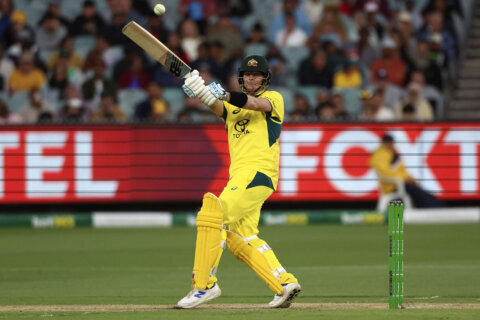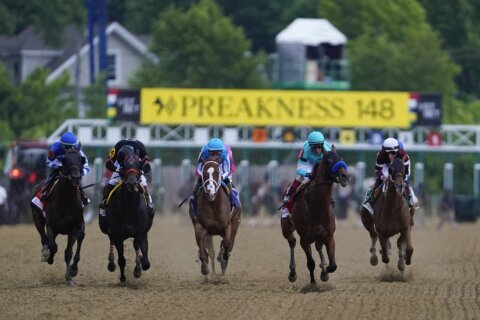The four Cubs pitchers were checked one by one as they left the mound Thursday night, and all passed inspection. Getting a grip on the baseball didn’t seem to be an issue at Dodger Stadium, where the visiting hurlers combined to throw the seventh no-hitter of the season in the major leagues.
Somehow, they managed to do it without hitting even one batter, laying to rest — for one night, at least — one of the lamest excuses offered up by pitchers desperate to keep putting sticky stuff on the ball. The idea that professional pitchers can’t control where the ball goes without super glue on it is about as preposterous as saying teams can’t get three outs in an inning without using a shift.
The same night in Florida, Boston pitchers took a no-hitter of their own into the eighth inning in a game the Red Sox would lose 1-0 to Tampa Bay. Professional hitters on both teams combined for a grand total of six hits while striking out 19 times.
And on Friday, Phillies pitcher Aaron Nola tied a major league record set 51 years ago by Tom Seaver by striking out 10 Mets in a row.
Not even a week into Rob Manfred’s crackdown on cheating pitchers, it’s pretty much business as usual across the big leagues. Spin rates may be down a bit but little else seems to have changed other than the side show that unfolds every time an umpire approaches a pitcher to make sure nothing is being hidden.
Hitters are still swinging and missing. And, so far at least, no one has been decapitated by a pitch that got away.
Apparently the old standby of sweat and rosin works pretty well, too. Either that or pitchers have found a way to apply the sticky stuff and still manage to avoid detection.
Whatever, the crackdown on sticky substances isn’t the game changer pitchers claimed it would be — or, it seems, the quick fix Manfred was after.
Conversely, it also doesn’t seem to be doing much to make the game any more watchable, though Manfred quickly claimed credit for what he said were positive trends in the analytics department.
But do give the commissioner credit for doing something — anything, really — to save a game that is in undeniable decline.
Lost in the theatrics — and semi-hysterics — over the shakedown pitchers must now endure is a simple calculation about major league baseball that has become apparent as the midpoint of the season nears.
Fewer things are happening in baseball games. And it’s taking them longer to happen.
That’s a losing recipe for any sport fighting for the eyeballs in today’s fractured media world. But for baseball it’s becoming a crisis that threatens the game itself.
The newly implemented enforcement of the ban on sticky stuff on baseballs won’t suddenly make things more interesting. MLB has let things go for too long to get the game back in one fell swoop.
But it just might prompt other changes to save the game we all love.
Manfred seems to understand that, even if he has presided over a degradation of baseball that began in earnest on Bud Selig’s watch. America’s national pastime is on its way to becoming a niche sport, and those running it ignore the slide in popularity at their own risk.
That there are more strikeouts than hits is only one part of a bigger problem. Baseball has turned into home run derby, with pitchers throwing as hard as they can, hitters swinging even harder, and little else happening otherwise.
Meanwhile, those who love the game for its strategy and nuances have watched, baffled that it could go this far.
That Manfred decided his first line of attack will be against cheaters who load up baseballs with sticky substances is, of course, loaded with irony. This is the same commissioner who refused to punish Houston players after they cheated their way to a World Series title in 2017, and he follows a commissioner who did little about steroid cheaters who helped get us where we are today.
But this is more about trying to correct an imbalance in the game than it is to ferret out cheaters. It’s doing something proactive to boost baseball other than simply trotting out some hideous new All-Star uniforms.
It’s also sending a message in advance of talks on a new collective bargaining agreement with players this postseason that if they don’t agree to changes in the game, the commissioner has the power to do some things on his own.
The bottom line is baseball has been trending in the wrong direction for a long time now.
And even a small step toward reversing that beats doing nothing at all.
___
Tim Dahlberg is a national sports columnist for The Associated Press. Write to him at tdahlberg@ap.org or http://twitter.com/timdahlberg
Copyright © 2024 The Associated Press. All rights reserved. This material may not be published, broadcast, written or redistributed.







